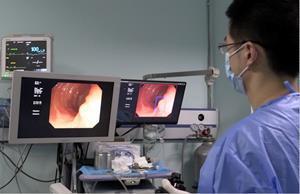Wision AI publishes data from first-ever prospective, randomized controlled trial evaluating AI in advanced diagnostics

Press releases may be edited for formatting or style | March 05, 2019
Artificial Intelligence

SHANGHAI, China, March 05, 2019 (GLOBE NEWSWIRE) -- Shanghai Wision AI Co., Ltd, a leader in developing computer-aided diagnostic algorithms and systems to improve the accuracy and effectiveness of diagnostic imaging, today announced results of the first-ever prospective, randomized controlled clinical trial of an artificial intelligence (AI)-based system for disease diagnosis. The study, which was conducted in 1,058 patients undergoing colonoscopy, found that the Wision AI system significantly increased adenoma and polyp detection rates and the mean number of adenomas and polyps detected per patient.
Clinicians at the Center for Advanced Endoscopy at Beth Israel Deaconess Medical Center (BIDMC), Harvard Medical School and the Sichuan Provincial People's Hospital conducted the study using the automated polyp detection system developed by Wision AI. The study results appear in the current issue of Gut : https://gut.bmj.com/content/early/2019/02/27/gutjnl-2018-317500
"The miss rate for colon polyps can be up to 27 percent. This limits the efficacy of screening colonoscopy, which is a critical tool for reducing the incidence and mortality of colorectal cancer by detecting and removing adenomatous polyps," said Tyler Berzin, MD, Co-Director, GI Endoscopy, and Director, Advanced Endoscopy Fellowship at BIDMC and Assistant Professor of Medicine at Harvard Medical School. "The results of this study clearly demonstrate that a high-performance, real-time automatic polyp detection system based on a deep learning algorithm can significantly increase polyp and adenoma detection, especially those that are 5 mm or less. Given its high accuracy, fidelity and stability, the Wision AI system could enable improved detection of colon polyps and adenomas in clinical practice."
"Given its high accuracy, fidelity and stability, the Wision AI system could enable improved detection of colon polyps in clinical practice," said Tyler Berzin, MD, Co-Director, GI Endoscopy.
A total of 1,130 patients met the eligibility criteria for the study and were randomized to undergo routine colonoscopy (n=567) or computer-assisted diagnosis (CAD) colonoscopy (n=563). Subsequent to randomization, 72 patients met exclusion criteria, resulting in 536 patients undergoing routine colonoscopy and 522 undergoing CAD colonoscopy. In the CAD group, the real-time automatic polyp detection system was used to assist the endoscopist. The endoscopist focused mainly on the original monitor during the procedure and was prompted to look at the system monitor by a sound alarm. The endoscopist was required to check every polyp that the system detected.
|
|
|
You Must Be Logged In To Post A Comment
|

